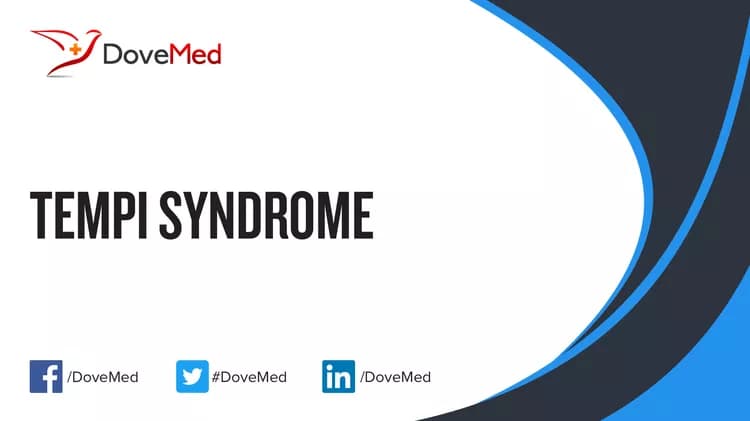What are the other Names for this Condition? (Also known as/Synonyms)
- Telangiectasia-Erythrocytosis-Monoclonal Gammopathy-Perinephric-Fluid Collections-Intrapulmonary Shunting
What is TEMPI Syndrome? (Definition/Background Information)
- TEMPI Syndrome is a newly discovered, multisystem condition named for 5 characteristics that affected individuals have: Telangiectasias, Erythrocytosis with elevated erythropoietin level, Monoclonal gammopathy, Perinephric-fluid collections (fluid around the kidney), and Intrapulmonary shunting (when a region of the lungs is supplied with blood but with little or no ventilation)
- Signs and symptoms of TEMPI Syndrome have appeared in mid-adulthood in all known affected individuals. The telangiectasias develop mostly on the face, trunk and arms.
- The intrapulmonary shunt causes hypoxia (not enough oxygen supply), which slowly progresses until the person needs continuous supplemental oxygen to support their breathing. Blood clots and bleeding in the brain have also been reported in some affected individuals.
- The cause of TEMPI Syndrome is currently unknown
- Treatment has reportedly been completely or partially successful with the medication bortezomib
(Source: TEMPI Syndrome; Genetic and Rare Disease Information Center (GARD) of National Center for Advancing Translational Science (NCATS), USA.)
Who gets TEMPI Syndrome? (Age and Sex Distribution)
- TEMPI Syndrome is a recently discovered and extremely rare disorder, with fewer than 10 cases reported in the medical literature
- The onset of symptoms typically occurs in mid-adulthood
- Both genders may be affected by this disorder
What are the Risk Factors for TEMPI Syndrome? (Predisposing Factors)
- Currently, no risk factors have been clearly identified for TEMPI Syndrome
It is important to note that having a risk factor does not mean that one will get the condition. A risk factor increases one’s chances of getting a condition compared to an individual without the risk factors. Some risk factors are more important than others.
Also, not having a risk factor does not mean that an individual will not get the condition. It is always important to discuss the effect of risk factors with your healthcare provider.
What are the Causes of TEMPI Syndrome? (Etiology)
- The exact cause of TEMPI Syndrome is not known at the present time
- It has been suggested that abnormal plasma-cell clone and/or monoclonal gammopathy may trigger the development of this disorder
What are the Signs and Symptoms of TEMPI Syndrome?
The signs and symptoms of TEMPI Syndrome may include:
- Abnormality of the kidney
- Hypoxemia
- Increased hematocrit
- Increased IgG level
- Telangiectasia
Based on the frequency of symptoms observed, the following information may be noted:
Very frequently present symptoms in 80-99% of the cases:
- Abnormality of the pulmonary vasculature
- Ascites
- Hemangioma
- Transudative pleural effusion
Frequently present symptoms in 30-79% of the cases:
- Intracranial hemorrhage
- Polycythemia
- Venous thrombosis
Occasionally present symptoms in 5-29% of the cases:
- Facial erythema
- Headache
(Source: TEMPI Syndrome; Genetic and Rare Disease Information Center (GARD) of National Center for Advancing Translational Science (NCATS), USA.)
How is TEMPI Syndrome Diagnosed?
TEMPI Syndrome is diagnosed on the basis of the following information:
- Complete physical examination
- Thorough medical history evaluation
- Assessment of signs and symptoms
- Laboratory tests
- Imaging studies
- Biopsy studies, if necessary
Many clinical conditions may have similar signs and symptoms. Your healthcare provider may perform additional tests to rule out other clinical conditions to arrive at a definitive diagnosis.
What are the possible Complications of TEMPI Syndrome?
The complications of TEMPI Syndrome may include:
- Progressive worsening of symptoms
- Permanent brain damage due to intracranial hemorrhage, causing disabilities
- Infection of ascites fluid
- Liver and kidney dysfunction
- Coma
Complications may occur with or without treatment, and in some cases, due to treatment also.
How is TEMPI Syndrome Treated?
Treatment for TEMPI Syndrome may include proteasome inhibitors, such as bortezomib.
How can TEMPI Syndrome be Prevented?
- The cause of TEMPI Syndrome is not known, and therefore, no preventive methods or guidelines are available at the present time may not be preventable
- Active research is currently being performed to explore the possibilities for treatment and prevention of disorders such as TEMPI Syndrome
- Regular medical screening at periodic intervals with tests and physical examinations are recommended
What is the Prognosis of TEMPI Syndrome? (Outcomes/Resolutions)
- The prognosis of TEMPI Syndrome is dependent upon the severity of the signs and symptoms and associated complications, if any
- TEMPI Syndrome is a slowly progressive disorder, and a timely diagnosis and prompt treatment with proteasome inhibitor bortezomib may be successful in treating this condition effectively
- Typically, the prognosis may be assessed on a case-by-case basis
Additional and Relevant Useful Information for TEMPI Syndrome:
The following DoveMed website link is a useful resource for additional information:
Related Articles
Test Your Knowledge
Asked by users
Related Centers
Related Specialties
Related Physicians
Related Procedures
Related Resources
Join DoveHubs
and connect with fellow professionals


0 Comments
Please log in to post a comment.